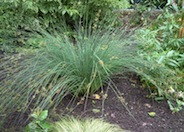
Common name:Japanese Anemone
Botanical name:Anemone X hybrida
Anemone japonica is a long-lived, fibrous-rooked perennial which produces great fall color when grown in partial shade. Its graceful, branching stems rise 2'-4' out of clumps of dark green, lobed, hair-covered foliage. Flowers are semi-double and are found in white or pink colors with green or yellow centers. Once established, it spreads rapidly as long as the roots remain undisturbed. It needs well draining, moist soil and partial shade.

Common name:Dymondia, Rock Ditty
Botanical name:Dymondia margaretae
This foliage is gray/green/silvery; it is a very dense, mat forming groundcover. It tolerates drought, cold, salt spray and poor soils. It's deep rooted and produces small, inconspicuous yellow flowers. Rock Ditty is great for use in between stepping stones or pavers.

Common name:Sea Pink, Common Thrift
Botanical name:Armeria maritima
This clumping, grass-like perennial is native to many areas, including coastal CA. Its flowers range from deep rose pink through white. -Monterey Bay Nursery

Common name:Fox Tail Agave, Velvet Agave
Botanical name:Agave attenuata
This Agave has a dramatic tropical form. Even light frost can damage its succulent leaves. It is great for containers. In the low desert, partial sun will be best. If it becomes top heavy, simply cut and stick in the ground to root. It is not a fast grower and has light green foliage. It will also die after flowering but pups around the mother will survive. Distinctive with its large rosette of leaves perched on a long curving trunk, it is a native from Mexico.

Common name:Eulalia or Japanese Silver Grass
Botanical name:Miscanthus sinensis
Miscanthus sinensis is popular ornamental grass. Flowers are held well above foliage clumps and may be cut for fresh or dry arrangements.

Common name:California Gray Rush
Botanical name:Juncus patens
Although a wetland plant, Juncus patens can tolerate fairly dry conditions. It will slowly clump to 2'-3' wide and a height of 2'-2.5'. There are many selections of this species available with different heights and widths. It is carefree, with little to no maintenance. It provides great upright structure to many styles of landscapes.
Compost for Healthy Soil and Plants
The natural world works in cycles. Everything is changing form and moving from place to place in an endless energy exchange system. The leaves and twigs that fall to the ground, not to mention other life forms that might die, decompose and combine with water, air and minerals of the soil to create a medium for future plants.
Click in the green box for more information
| Designer: Rick Fisher | Shade Corner |
Photographer: GardenSoft |
Soils and Compost:
Maintain a two to four inch layer of mulch on the soil surface to reduce weeds, infiltrate rain water, and reduce compaction.
Water Saving Tip:
Integrated Pest Management:
Attract, or buy beneficial insects such as ladybugs and lacewings to control pest outbreaks in your garden.
